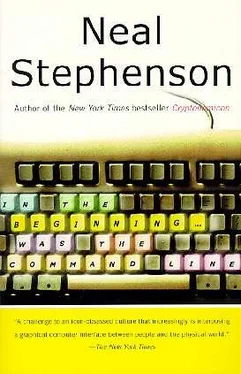Neal Stephenson - In the Beginning was the Command Line
Здесь есть возможность читать онлайн «Neal Stephenson - In the Beginning was the Command Line» весь текст электронной книги совершенно бесплатно (целиком полную версию без сокращений). В некоторых случаях можно слушать аудио, скачать через торрент в формате fb2 и присутствует краткое содержание. Жанр: Фантастика и фэнтези, на английском языке. Описание произведения, (предисловие) а так же отзывы посетителей доступны на портале библиотеки ЛибКат.
- Название:In the Beginning was the Command Line
- Автор:
- Жанр:
- Год:неизвестен
- ISBN:нет данных
- Рейтинг книги:5 / 5. Голосов: 1
-
Избранное:Добавить в избранное
- Отзывы:
-
Ваша оценка:
- 100
- 1
- 2
- 3
- 4
- 5
In the Beginning was the Command Line: краткое содержание, описание и аннотация
Предлагаем к чтению аннотацию, описание, краткое содержание или предисловие (зависит от того, что написал сам автор книги «In the Beginning was the Command Line»). Если вы не нашли необходимую информацию о книге — напишите в комментариях, мы постараемся отыскать её.
In the Beginning was the Command Line — читать онлайн бесплатно полную книгу (весь текст) целиком
Ниже представлен текст книги, разбитый по страницам. Система сохранения места последней прочитанной страницы, позволяет с удобством читать онлайн бесплатно книгу «In the Beginning was the Command Line», без необходимости каждый раз заново искать на чём Вы остановились. Поставьте закладку, и сможете в любой момент перейти на страницу, на которой закончили чтение.
Интервал:
Закладка:
We like plain dealings and straightforward transactions in America. If you go to Egypt and, say, take a taxi somewhere, you become a part of the taxi driver's life; he refuses to take your money because it would demean your friendship, he follows you around town, and weeps hot tears when you get in some other guy's taxi. You end up meeting his kids at some point, and have to devote all sort of ingenuity to finding some way to compensate him without insulting his honor. It is exhausting. Sometimes you just want a simple Manhattan-style taxi ride.
But in order to have an American-style setup, where you can just go out and hail a taxi and be on your way, there must exist a whole hidden apparatus of medallions, inspectors, commissions, and so forth--which is fine as long as taxis are cheap and you can always get one. When the system fails to work in some way, it is mysterious and infuriating and turns otherwise reasonable people into conspiracy theorists. But when the Egyptian system breaks down, it breaks down transparently. You can't get a taxi, but your driver's nephew will show up, on foot, to explain the problem and apologize.
Microsoft and Apple do things the Manhattan way, with vast complexity hidden behind a wall of interface. Linux does things the Egypt way, with vast complexity strewn about all over the landscape. If you've just flown in from Manhattan, your first impulse will be to throw up your hands and say "For crying out loud! Will you people get a grip on yourselves!?" But this does not make friends in Linux-land any better than it would in Egypt.
You can suck Linux right out of the air, as it were, by downloading the right files and putting them in the right places, but there probably are not more than a few hundred people in the world who could create a functioning Linux system in that way. What you really need is a distribution of Linux, which means a prepackaged set of files. But distributions are a separate thing from Linux per se.
Linux per se is not a specific set of ones and zeroes, but a self-organizing Net subculture. The end result of its collective lucubrations is a vast body of source code, almost all written in C (the dominant computer programming language). "Source code" just means a computer program as typed in and edited by some hacker. If it's in C, the file name will probably have .c or .cpp on the end of it, depending on which dialect was used; if it's in some other language it will have some other suffix. Frequently these sorts of files can be found in a directory with the name /src which is the hacker's Hebraic abbreviation of "source."
Source files are useless to your computer, and of little interest to most users, but they are of gigantic cultural and political significance, because Microsoft and Apple keep them secret while Linux makes them public. They are the family jewels. They are the sort of thing that in Hollywood thrillers is used as a McGuffin: the plutonium bomb core, the top-secret blueprints, the suitcase of bearer bonds, the reel of microfilm. If the source files for Windows or MacOS were made public on the Net, then those OSes would become free, like Linux--only not as good, because no one would be around to fix bugs and answer questions. Linux is "open source" software meaning, simply, that anyone can get copies of its source code files.
Your computer doesn't want source code any more than you do; it wants object code. Object code files typically have the suffix .o and are unreadable all but a few, highly strange humans, because they consist of ones and zeroes. Accordingly, this sort of file commonly shows up in a directory with the name /bin, for "binary."
Source files are simply ASCII text files. ASCII denotes a particular way of encoding letters into bit patterns. In an ASCII file, each character has eight bits all to itself. This creates a potential "alphabet" of 256 distinct characters, in that eight binary digits can form that many unique patterns. In practice, of course, we tend to limit ourselves to the familiar letters and digits. The bit-patterns used to represent those letters and digits are the same ones that were physically punched into the paper tape by my high school teletype, which in turn were the same one used by the telegraph industry for decades previously. ASCII text files, in other words, are telegrams, and as such they have no typographical frills. But for the same reason they are eternal, because the code never changes, and universal, because every text editing and word processing software ever written knows about this code.
Therefore just about any software can be used to create, edit, and read source code files. Object code files, then, are created from these source files by a piece of software called a compiler, and forged into a working application by another piece of software called a linker.
The triad of editor, compiler, and linker, taken together, form the core of a software development system. Now, it is possible to spend a lot of money on shrink-wrapped development systems with lovely graphical user interfaces and various ergonomic enhancements. In some cases it might even be a good and reasonable way to spend money. But on this side of the road, as it were, the very best software is usually the free stuff. Editor, compiler and linker are to hackers what ponies, stirrups, and archery sets were to the Mongols. Hackers live in the saddle, and hack on their own tools even while they are using them to create new applications. It is quite inconceivable that superior hacking tools could have been created from a blank sheet of paper by product engineers. Even if they are the brightest engineers in the world they are simply outnumbered.
In the GNU/Linux world there are two major text editing programs: the minimalist vi (known in some implementations as elvis) and the maximalist emacs. I use emacs, which might be thought of as a thermonuclear word processor. It was created by Richard Stallman; enough said. It is written in Lisp, which is the only computer language that is beautiful. It is colossal, and yet it only edits straight ASCII text files, which is to say, no fonts, no boldface, no underlining. In other words, the engineer-hours that, in the case of Microsoft Word, were devoted to features like mail merge, and the ability to embed feature-length motion pictures in corporate memoranda, were, in the case of emacs, focused with maniacal intensity on the deceptively simple-seeming problem of editing text. If you are a professional writer--i.e., if someone else is getting paid to worry about how your words are formatted and printed--emacs outshines all other editing software in approximately the same way that the noonday sun does the stars. It is not just bigger and brighter; it simply makes everything else vanish. For page layout and printing you can use TeX: a vast corpus of typesetting lore written in C and also available on the Net for free.
I could say a lot about emacs and TeX, but right now I am trying to tell a story about how to actually install Linux on your machine. The hard-core survivalist approach would be to download an editor like emacs, and the GNU Tools--the compiler and linker--which are polished and excellent to the same degree as emacs. Equipped with these, one would be able to start downloading ASCII source code files (/src) and compiling them into binary object code files (/bin) that would run on the machine. But in order to even arrive at this point--to get emacs running, for example--you have to have Linux actually up and running on your machine. And even a minimal Linux operating system requires thousands of binary files all acting in concert, and arranged and linked together just so.
Several entities have therefore taken it upon themselves to create "distributions" of Linux. If I may extend the Egypt analogy slightly, these entities are a bit like tour guides who meet you at the airport, who speak your language, and who help guide you through the initial culture shock. If you are an Egyptian, of course, you see it the other way; tour guides exist to keep brutish outlanders from traipsing through your mosques and asking you the same questions over and over and over again.
Читать дальшеИнтервал:
Закладка:
Похожие книги на «In the Beginning was the Command Line»
Представляем Вашему вниманию похожие книги на «In the Beginning was the Command Line» списком для выбора. Мы отобрали схожую по названию и смыслу литературу в надежде предоставить читателям больше вариантов отыскать новые, интересные, ещё непрочитанные произведения.
Обсуждение, отзывы о книге «In the Beginning was the Command Line» и просто собственные мнения читателей. Оставьте ваши комментарии, напишите, что Вы думаете о произведении, его смысле или главных героях. Укажите что конкретно понравилось, а что нет, и почему Вы так считаете.








